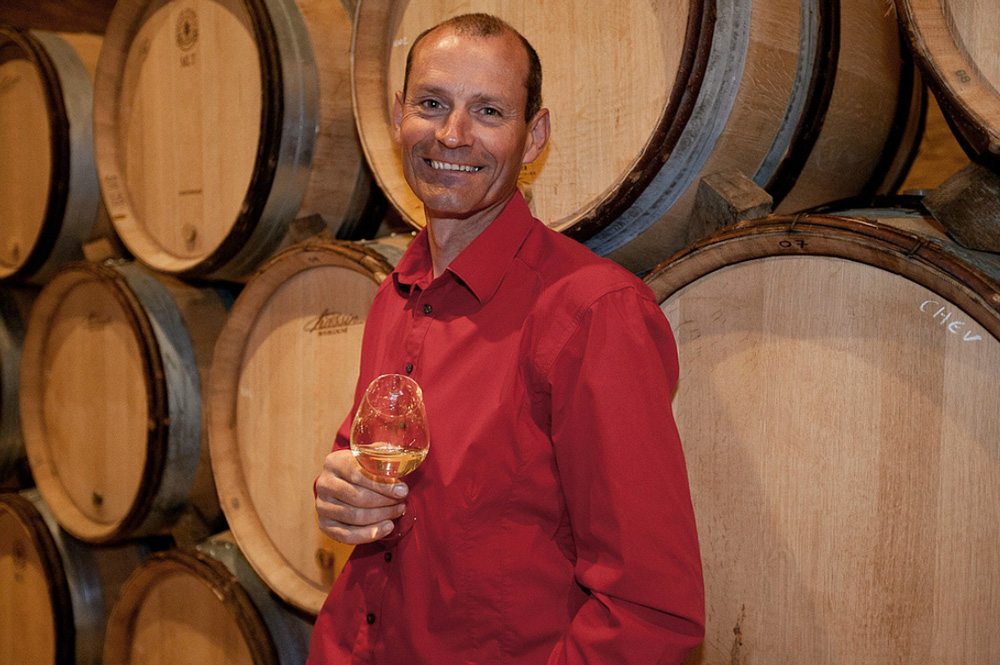Jean-Philippe Fichet
VISIT THIS PRODUCER'S WEBSITE
VISIT IMPORTER'S WEBSITE
Country of Origin: France
Location: Meursault, Côte de Beaune
People: Jean-Philippe Fichet, Owner & Winemaker
Viticulture: Practicing Organic
Items
Social Media
Instagram: @domaine_jean_philippe_fichet
Jean-Philippe Fichet Facebook
The Magic Within
More than any of his peers, Fichet is testing the limits of transparency, to find the very soul of Meursault's terroirs. It was Meursault's destiny to have its soils revealed in this way: their intense stoniness is magnified by an exceptionally low water table, forcing the vines' roots deep underground.
Fichet's work is a direct outgrowth of a breakthrough that happened three decades ago: René Lafon's decision to bottle his Meursault Clos de la Barre on its own. For a century before, such a thing had been unheard of, as only the most famous vineyards—the premier crus—were ever bottled individually; everything else was blended into Meursault villages. Lafon's innovation not only proved that a lieu-dit (a non-classified vineyard) could say something profound, it drew attention to Meursault's incredible soils—paving the way for the later accomplishments of Jean-Françoise Coche, Jean-Marc Roulot and, of course, René Lafon's son Dominique. But Fichet has carried Lafon's revolution to another level— studying every square inch of earth and stone in his domaine, to make Meursault's purest set of single-climate wines.
Purity & Passion
Even if uneconomical, Fichet would rather produce a very small amount of wine from his best sites than to lose their unique character in a blend. In 1998, his Meursault-Tesson vines yielded little more than four barrels; anyone else would have blended so little wine into their village cuvée. But the Tesson was so magical that Fichet bottled it separately, exclusively in magnum.
Just as Jean-Marc Roulot did until recently, Fichet has flown largely under the world's radar. He began as a grower in 1981 but was forced to rebuild his domaine from scratch in the 1990s, having lost all his best fruit sources—including a piece of Meursault- Perrières—for lack of long-term contracts. But he learned from this experience. By 2000, he had used carefully negotiated long-term fermage and mètayage agreements to create an extraordinary new domaine, brimming with exceptional sites.
No Short Cuts
Fichet's methods reflect his philosophy: he is famously meticulous and abhors taking short cuts. His low yields, the foremost key to quality, are achieved through severe winter pruning rather than by green harvesting. And he believes his wines' expressiveness is enhanced through a patient eighteen-month élevage with little new oak and by avoiding aggressive lees stirring.
The Best is Yet to Come.
The wines that Jean-Philippe Fichet is making today have few rivals for their class in Burgundy, and they could be unmatched in their transparency and expressiveness. As good as Fichet's wines have been up to now, the best lies ahead. His winemaking gets better each year and so do his holdings. Jean-Philippe Fichet is one of Burgundy's greatest talents—and his wines are every bit as extraordinary as he is. It is an honor to represent this brilliant winemaker for the United States.
Jamie Goode, Wineanorak.com
"Fichet is a genius, but is probably less well known than he deserves to be because he has no premier cru or grand cru vineyards in Meursault (although he used to have a bit of Perrières, which he lost in 1996 when the owner died). Instead, Fichet is the expert of bringing out the very best from village level ‘Lieux Dits’: name-designated vineyards that aren’t considered to be of premier cru status. With his meticulous viticulture and mastery of long élévage, he is able to fashion complex, ageworthy wines from these sites that put most peoples’ premier cru wines to shame." -
The Wine Advocate 8/2013
"'The 2012s will be good but they risk being opulent,' said Fichet. 'The wines have balance and depth, and no rot due to the small clusters and the spaces between the grapes. But the tiny crops are never the best: without enough juice in the grapes, the wines can be too powerful, or even heavy.' Fichet has done almost no settling of the must during the past three vintages and adapts his batonnage to the vintage. In 2012 he did what he described as very little batonnage (some wines were stirred just two or three times, and others up to ten)."

